View in other NatureServe Network Field Guides
NatureServe
Montana
Utah
Wyoming
Idaho
Wisconsin
British Columbia
South Carolina
Yukon
California
New York
Limestone Larkspur - Delphinium bicolor ssp. calcicola
State Rank Reason (see State Rank above)
A Montana endemic.
General Description
Limestone Larkspur is a perennial 10-30 cm tall arising from deep roots branched at least 1 cm below the stem attachment. Leaves are on the lower 1/3 of the stem, with 2-7 basal leaves at the time of flowering. Leaf blades are 1.5-7 cm long, round in outline, with few-many lobes, and glabrous to puberulent. Sepals are bright, dark blue, 16-21 mm long, and there is a cleft in the lower petals at least 2 mm deep.
Phenology
Flowering late spring to early summer although usually somewhat later than the typical subspecies where the two overlap.
Diagnostic Characteristics
Distinguished from the widespread Delphinium bicolor ssp. bicolor by the bright blue sepals, the deep cleft in the lower petal blades 2 mm or greater, and upper petals with solid white-lavender tips rather than with distinct purple veins. Previous collections of this taxon have typically been identified as D. andersonii or D. geyeri.
Species Range
Montana Range
Range Descriptions
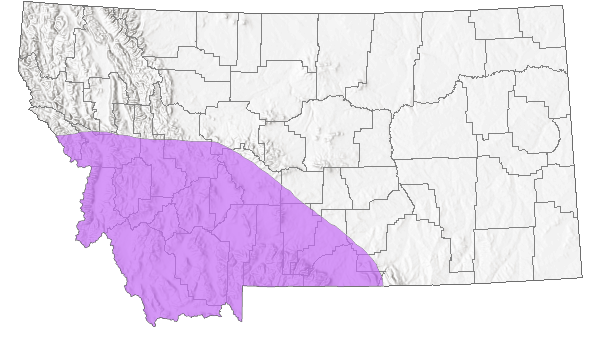
 Native
Native
Range Comments
Endemic to Montana.
Observations in Montana Natural Heritage Program Database
Number of Observations: 67
(Click on the following maps and charts to see full sized version)
Map Help and Descriptions
Relative Density
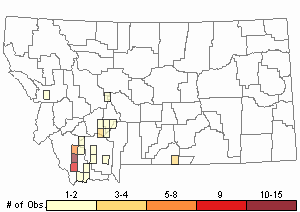
Recency
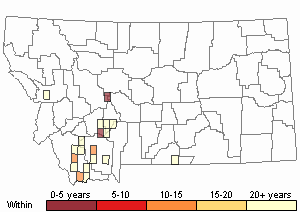
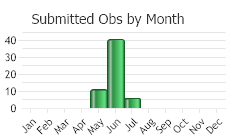
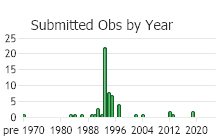
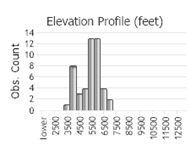 (Observations spanning multiple months or years are excluded from time charts)
(Observations spanning multiple months or years are excluded from time charts)
Habitat
Shortgrass prairie and grass-sagebrush communities on limestone-derived soils, usually with coarse fragments at the surface, or on limestone outcrops. 1300-2100 m elevation.
Ecology
POLLINATORS The following animal species have been reported as pollinators of this plant species or its genus where their geographic ranges overlap:
Bombus vagans,
Bombus appositus,
Bombus auricomus,
Bombus borealis,
Bombus centralis,
Bombus fervidus,
Bombus flavifrons,
Bombus mixtus,
Bombus occidentalis,
Bombus pensylvanicus,
Bombus griseocollis,
Bombus impatiens, and
Bombus kirbiellus (Plath 1934, Macior 1974, Bauer 1983, Thorp et al. 1983, Wilson et al. 2010, Colla and Dumesh 2010, Koch et al. 2012, Pyke et al. 2012, Miller-Struttmann and Galen 2014, Williams et al. 2014).
Stewardship Responsibility
Threats or Limiting Factors
STATE THREAT SCORE REASON
Threat impact not assigned because threats are not known (MTNHP Threat Assessment 2021).
References
- Literature Cited AboveLegend:
 View Online Publication
View Online Publication Bauer, P.J. 1983. Bumblebee pollination relationships on the Beartooth Plateau tundra of Southern Montana. American Journal of Botany. 70(1): 134-144.
Bauer, P.J. 1983. Bumblebee pollination relationships on the Beartooth Plateau tundra of Southern Montana. American Journal of Botany. 70(1): 134-144. Colla, S.R. and S. Dumesh. 2010. The bumble bees of southern Ontario: notes on natural history and distribution. Journal of the Entomological Society of Ontario 141:39-68.
Colla, S.R. and S. Dumesh. 2010. The bumble bees of southern Ontario: notes on natural history and distribution. Journal of the Entomological Society of Ontario 141:39-68. Koch, J., J. Strange, and P. Williams. 2012. Bumble bees of the western United States. Washington, DC: USDA Forest Service, Pollinator Partnership. 143 p.
Koch, J., J. Strange, and P. Williams. 2012. Bumble bees of the western United States. Washington, DC: USDA Forest Service, Pollinator Partnership. 143 p. Macior, L.M. 1974. Pollination ecology of the Front Range of the Colorado Rocky Mountains. Melanderia 15: 1-59.
Macior, L.M. 1974. Pollination ecology of the Front Range of the Colorado Rocky Mountains. Melanderia 15: 1-59. Miller-Struttmann, N.E. and C. Galen. 2014. High-altitude multi-taskers: bumble bee food plant use broadens along an altitudinal productivity gradient. Oecologia 176:1033-1045.
Miller-Struttmann, N.E. and C. Galen. 2014. High-altitude multi-taskers: bumble bee food plant use broadens along an altitudinal productivity gradient. Oecologia 176:1033-1045. MTNHP Threat Assessment. 2021. State Threat Score Assignment and Assessment of Reported Threats from 2006 to 2021 for State-listed Vascular Plants. Botany Program, Montana Natural Heritage Program, Helena, Montana.
MTNHP Threat Assessment. 2021. State Threat Score Assignment and Assessment of Reported Threats from 2006 to 2021 for State-listed Vascular Plants. Botany Program, Montana Natural Heritage Program, Helena, Montana. Plath, O.E. 1934. Bumblebees and their ways. New York, NY: Macmillan Company. 201 p.
Plath, O.E. 1934. Bumblebees and their ways. New York, NY: Macmillan Company. 201 p. Pyke, G.H., D.W. Inouye, and J.D. Thomson. 2012. Local geographic distributions of bumble bees near Crested Butte, Colorado: competition and community structure revisited. Environmental Entomology 41(6): 1332-1349.
Pyke, G.H., D.W. Inouye, and J.D. Thomson. 2012. Local geographic distributions of bumble bees near Crested Butte, Colorado: competition and community structure revisited. Environmental Entomology 41(6): 1332-1349. Thorp, R.W., D.S. Horning, and L.L. Dunning. 1983. Bumble bees and cuckoo bumble bees of California (Hymenoptera: Apidae). Bulletin of the California Insect Survey 23:1-79.
Thorp, R.W., D.S. Horning, and L.L. Dunning. 1983. Bumble bees and cuckoo bumble bees of California (Hymenoptera: Apidae). Bulletin of the California Insect Survey 23:1-79. Williams, P., R. Thorp, L. Richardson, and S. Colla. 2014. Bumble Bees of North America. Princeton, NJ: Princeton University Press. 208 p.
Williams, P., R. Thorp, L. Richardson, and S. Colla. 2014. Bumble Bees of North America. Princeton, NJ: Princeton University Press. 208 p. Wilson, J.S., L.E. Wilson, L.D. Loftis, and T. Griswold. 2010. The montane bee fauna of north central Washington, USA, with floral associations. Western North American Naturalist 70(2): 198-207.
Wilson, J.S., L.E. Wilson, L.D. Loftis, and T. Griswold. 2010. The montane bee fauna of north central Washington, USA, with floral associations. Western North American Naturalist 70(2): 198-207.
- Additional ReferencesLegend:
 View Online Publication
View Online Publication
Do you know of a citation we're missing? Heidel, B.L. 1995. Sensitive plant survey at the southern end of the Elkhorn Mountains, Broadwater and Jefferson Counties, Montana. Unpublished report to the Bureau of Land Management. Montana Natural Heritage Program, Helena, Montana. 12 pp. plus appendices.
Heidel, B.L. 1995. Sensitive plant survey at the southern end of the Elkhorn Mountains, Broadwater and Jefferson Counties, Montana. Unpublished report to the Bureau of Land Management. Montana Natural Heritage Program, Helena, Montana. 12 pp. plus appendices. Lesica, P., M.T. Lavin, and P.F. Stickney. 2012. Manual of Montana Vascular Plants. Fort Worth, TX: BRIT Press. viii + 771 p.
Lesica, P., M.T. Lavin, and P.F. Stickney. 2012. Manual of Montana Vascular Plants. Fort Worth, TX: BRIT Press. viii + 771 p. Lesica, P., M.T. Lavin, and P.F. Stickney. 2022. Manual of Montana Vascular Plants, Second Edition. Fort Worth, TX: BRIT Press. viii + 779 p.
Lesica, P., M.T. Lavin, and P.F. Stickney. 2022. Manual of Montana Vascular Plants, Second Edition. Fort Worth, TX: BRIT Press. viii + 779 p. Mincemoyer, S. 2005. Surveys of significant plant resources and related vegetation types for the Butte Office of the Bureau of Land Management. Montana Natural Heritage Program, Helena, MT. 11 pp + appendices.
Mincemoyer, S. 2005. Surveys of significant plant resources and related vegetation types for the Butte Office of the Bureau of Land Management. Montana Natural Heritage Program, Helena, MT. 11 pp + appendices. Poole, J.M. and B.L. Heidel. 1993. Sensitive plant surveys in the Big Belt and Elkhorn Mountains, Helena National Forest, Montana. Unpublished report to the Helena National Forest. Montana Natural Heritage Program. Helena, MT. 129 pp. plus printouts, maps.
Poole, J.M. and B.L. Heidel. 1993. Sensitive plant surveys in the Big Belt and Elkhorn Mountains, Helena National Forest, Montana. Unpublished report to the Helena National Forest. Montana Natural Heritage Program. Helena, MT. 129 pp. plus printouts, maps. Sawyer, P.T. 1967. Taxonomic study of Montana DelphiniumS. Proceedings Montana Acadamy of Science 27:20-25.
Sawyer, P.T. 1967. Taxonomic study of Montana DelphiniumS. Proceedings Montana Acadamy of Science 27:20-25. Vanderhorst, J.P. and B.L. Heidel. 1995. Sensitive plant survey in the Tobacco Root Mountains, Madison County, Montana. Unpublished report to the Beaverhead and Deerlodge National Forests. Montana Natural Heritage Program. Helena, MT. 66 pp. plus appendices.
Vanderhorst, J.P. and B.L. Heidel. 1995. Sensitive plant survey in the Tobacco Root Mountains, Madison County, Montana. Unpublished report to the Beaverhead and Deerlodge National Forests. Montana Natural Heritage Program. Helena, MT. 66 pp. plus appendices. Vanderhorst, J.P. and P. Lesica. 1995a. Sensitive plant survey of the Tendoy Mountains in the Beaverhead National Forest, Beaverhead County, Montana. Unpublished report to the Bureau of Land Management, Butte District. Montana Natural Heritage Program, Helena, MT. 59 pp. plus appendices.
Vanderhorst, J.P. and P. Lesica. 1995a. Sensitive plant survey of the Tendoy Mountains in the Beaverhead National Forest, Beaverhead County, Montana. Unpublished report to the Bureau of Land Management, Butte District. Montana Natural Heritage Program, Helena, MT. 59 pp. plus appendices. Warnock, M.J. 1995. A taxonomic conspectus of North American Delphinium. Phytologia 78(2):73-101.
Warnock, M.J. 1995. A taxonomic conspectus of North American Delphinium. Phytologia 78(2):73-101.
- Web Search Engines for Articles on "Limestone Larkspur"





